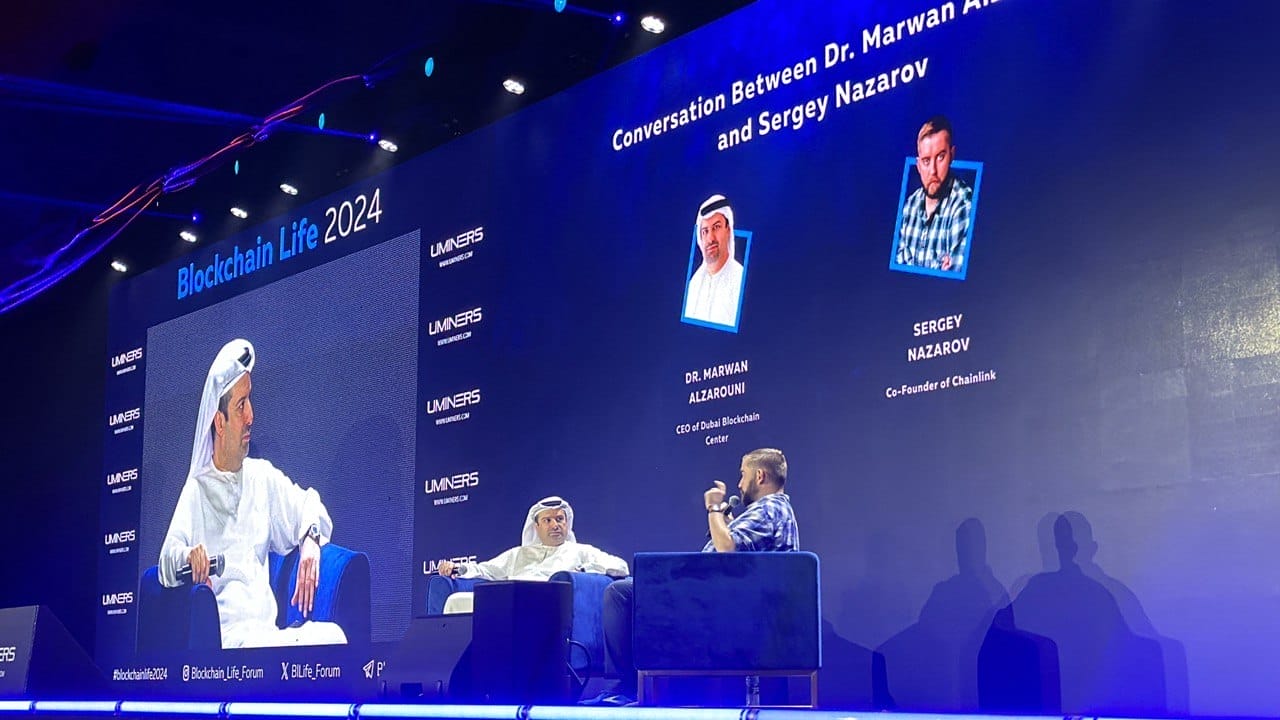Today during Blockchain Life 2024 in Dubai, UAE, Chainlink co-founder Sergey Nazarov took the stage with Dr. Marwan Alzarouni, CEO of Dubai Blockchain Center, for a fireside chat about the role government regulation, legal clarity, and decentralized infrastructure will play in accelerating blockchain adoption in Dubai and throughout the world.
Nazarov described the present moment as a unique stage in DeFi’s evolution.
“DeFi has grown into an inescapable market,” he said. The next hurdle to overcome is connecting blockchains to the world’s “huge amount” of regulated, compliant value in the banking and asset management sectors, primarily by enabling the creation of tokenized real-world assets such as carbon credits, private equity, and real estate.
As the industry-standard decentralized computing platform, Chainlink is building a comprehensive suite of critical infrastructure that facilitates the “tokenization of everything in the traditional financial system,” according to Nazarov. “All the value in the current financial system is going to get reformatted into this new blockchain-based format,” he said.
Chainlink’s time-tested oracle infrastructure, which has enabled over $10.5 trillion in transaction value, connects blockchains to offchain data and computation that is critical for creating and securing tokenized assets and stablecoins capable of scaling onchain finance to billions of users.
As illustrated by Swift’s proof of concept, Chainlink’s Cross-Chain Interoperability Protocol (CCIP) unlocks new markets and use cases for tokenized assets by allowing them to flow freely between private bank chains and public DeFi applications, eliminating liquidity silos and paving the way for what Nazarov envisions will become a global internet of contracts.
Because CCIP can also send data and messages cross-chain, tokenized assets can be programmatically transferred with instructions for use on the destination chain.
Alzarouni highlighted programmable money as a particularly exciting use case for Dubai.
“I think Chainlink will be the key driver for this kind of adoption,” he said.
Nazarov expects tokenized assets will gain prominence as the “superior form” of an asset through services like Proof of Reserve (PoR), which leverages Chainlink oracles to verify in real time that onchain assets are fully collateralized by cross-chain or offchain assets. “It’s superior because it proves things about the asset in ways that the existing financial system doesn’t,” he said.
Central Bank Digital Currency (CBDC), the digital form of a country’s fiat currency, will also have an important role to play in the world of tokenized assets and onchain finance. “The CBDC side of the equation is very useful for creating a regulated, compliant, riskless form of payment,” Nazarov explained.
“That circular economy is actually where we will see a lot of efficiency coming into the liquidity provisioning and merging between the two worlds of crypto and real-life assets,” Alzarouni agreed.
As more value moves from the traditional financial system onchain, Nazarov believes blockchains will become status quo. When it comes to establishing places like Dubai as hubs for blockchain innovation, he highlighted legal clarity as a big area of leadership.
“Hopefully the legal clarity that’s being created here in Dubai and other places will allow enough of the banks and asset managers to put more and more of their value onchain in a way that it’s legally able to interact with DeFi and web3,” he said. “The places that create the legal clarity for that to happen sooner will have it happen sooner.”
Watch the full discussion.


